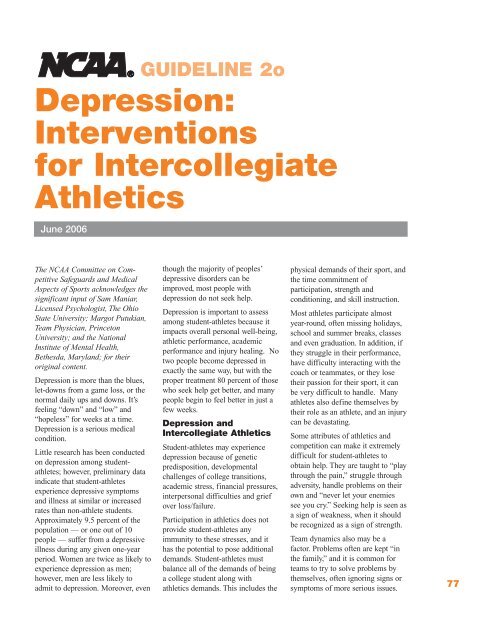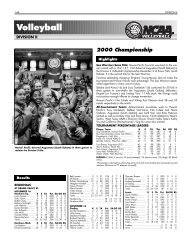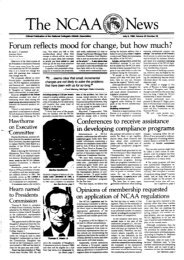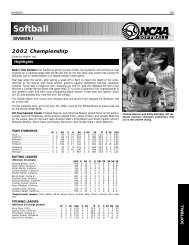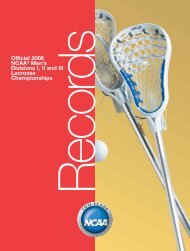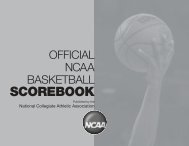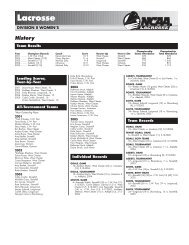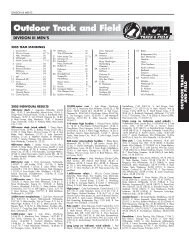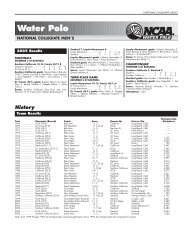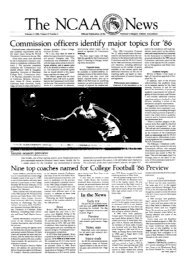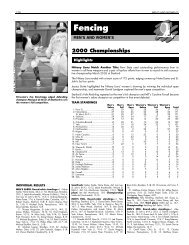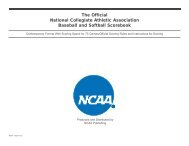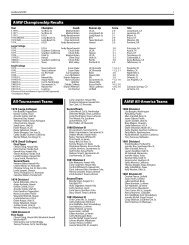Sports Medicine Handbook - NCAA
Sports Medicine Handbook - NCAA
Sports Medicine Handbook - NCAA
Create successful ePaper yourself
Turn your PDF publications into a flip-book with our unique Google optimized e-Paper software.
Depression:<br />
Interventions<br />
for Intercollegiate<br />
Athletics<br />
June 2006<br />
The <strong>NCAA</strong> Committee on Competitive<br />
Safeguards and Medical<br />
Aspects of <strong>Sports</strong> acknowledges the<br />
significant input of Sam Maniar,<br />
Licensed Psychologist, The Ohio<br />
State University; Margot Putukian,<br />
Team Physician, Princeton<br />
University; and the National<br />
Institute of Mental Health,<br />
Bethesda, Maryland; for their<br />
original content.<br />
Depression is more than the blues,<br />
let-downs from a game loss, or the<br />
normal daily ups and downs. It’s<br />
feeling “down” and “low” and<br />
“hopeless” for weeks at a time.<br />
Depression is a serious medical<br />
condition.<br />
Little research has been conducted<br />
on depression among studentathletes;<br />
however, preliminary data<br />
indicate that student-athletes<br />
experience depressive symptoms<br />
and illness at similar or increased<br />
rates than non-athlete students.<br />
Ap prox imately 9.5 percent of the<br />
population — or one out of 10<br />
people — suffer from a depressive<br />
illness during any given one-year<br />
period. Women are twice as likely to<br />
experience depression as men;<br />
however, men are less likely to<br />
admit to depression. Moreover, even<br />
GUIDELINE 2o<br />
though the majority of peoples’<br />
depressive disorders can be<br />
im proved, most people with<br />
depression do not seek help.<br />
Depression is important to assess<br />
among student-athletes because it<br />
impacts overall personal well-being,<br />
athletic performance, academic<br />
performance and injury healing. No<br />
two people become de pressed in<br />
exactly the same way, but with the<br />
proper treatment 80 percent of those<br />
who seek help get better, and many<br />
people begin to feel better in just a<br />
few weeks.<br />
Depression and<br />
Intercollegiate Ath letics<br />
Student-athletes may experience<br />
depression because of genetic<br />
predisposition, developmental<br />
challenges of college transitions,<br />
academic stress, financial pressures,<br />
interpersonal difficulties and grief<br />
over loss/failure.<br />
Participation in athletics does not<br />
provide student-athletes any<br />
immunity to these stresses, and it<br />
has the potential to pose additional<br />
de mands. Student-athletes must<br />
balance all of the demands of being<br />
a college student along with<br />
athletics demands. This includes the<br />
physical demands of their sport, and<br />
the time commitment of<br />
participation, strength and<br />
conditioning, and skill instruction.<br />
Most athletes participate almost<br />
year-round, often missing holidays,<br />
school and summer breaks, classes<br />
and even graduation. In addition, if<br />
they struggle in their performance,<br />
have difficulty interacting with the<br />
coach or teammates, or they lose<br />
their passion for their sport, it can<br />
be very difficult to handle. Many<br />
athletes also define themselves by<br />
their role as an athlete, and an injury<br />
can be devastating.<br />
Some attributes of athletics and<br />
competition can make it extremely<br />
difficult for student-athletes to<br />
obtain help. They are taught to “play<br />
through the pain,” struggle through<br />
adversity, handle problems on their<br />
own and “never let your enemies<br />
see you cry.” Seeking help is seen as<br />
a sign of weakness, when it should<br />
be recognized as a sign of strength.<br />
Team dynamics also may be a<br />
factor. Problems often are kept “in<br />
the family,” and it is common for<br />
teams to try to solve problems by<br />
themselves, often ignoring signs or<br />
symptoms of more serious issues.<br />
77


